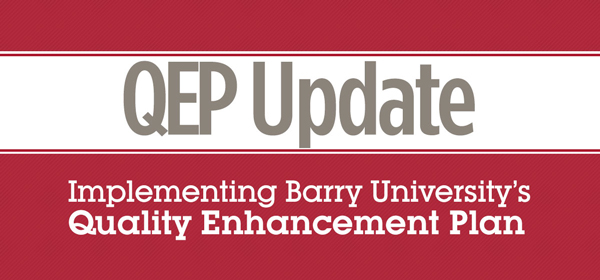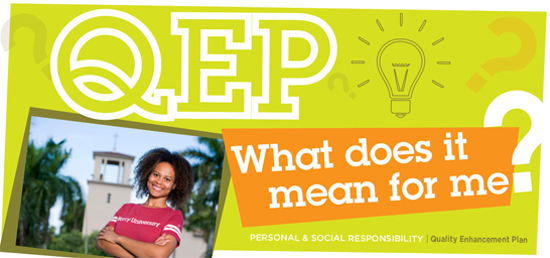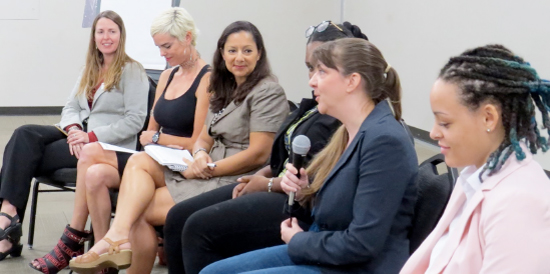|
|

|
Community Engagement Symposium Includes Workshop, Seminar and Poster Sessions
A workshop, seminar, concurrent presentations, and poster session are the main components of Barry University’s fifth annual Community Engagement Symposium, which will be held on March 28, from 9 a.m. to 4 p.m. Registration for the symposium is underway. Organized around the theme “Demonstrating Social Responsibility through Experiential Learning,” the symposium will feature Nadinne Cruz, former director of the Haas Center for Public Service at Stanford University, as the lead presenter. An internationally recognized experiential learning expert, Cruz will lead a 10–11:15 a.m. workshop on the topic, “Doing Justice, Making Peace in a Divided World,” and a 12:30–1:45 p.m. seminar titled “Community Engagement as Epistemic Justice and Democratic Practice.” Five concurrent presentations are listed at the registration site. They include “Collaboration with Community Partners: Oral Histories of Virginia Key Beach — ‘The Colored Beach.’” The other presentations are titled as follows: “Educational Initiatives of the Barry University Nursing and Education International Learning Partnership”; “Gender Differences in Attitudes towards Experiential Learning”; “Humanitarian Protection for the ‘Dreamers’ in America”; and “Promoting and Evaluating Youth Empowerment through Face-to-Face Social Learning and the videoRehearser Media Platform.” The symposium will also include a student poster competition aimed at showcasing and recognizing students’ course-based and co-curricular work focused on social responsibility. Entries for the competition will be displayed during the poster session, which is slated for Room 112 of the Andreas Building from 2-3:30 p.m. Although any student, faculty and staff member may participate in the poster session, the competition is open only to undergraduates. Prizes will be presented during the closing session of the symposium, which immediately follows the poster session.
Experiential learning includes service-learning, community-based research, fieldwork, clinical rotations, study abroad, capstones, and internships. The social responsibility outcomes are linked primarily to the “community engagement and collaboration” category of the QEP. The opening session of the symposium is set for 9:30 a.m. and the closing session at 3:30 p.m. Dr. Victor Romano, associate vice provost for student success and undergraduate studies, will deliver the opening address, and Dr. Karen Callaghan, chair of the QEP Implementation Committee, will make closing remarks.
|
|||||||||||||||||||||||||
Competition to Test Students’ Knowledge of QEP Ends March 23
Students will continue to test their knowledge of Barry’s Quality Enhancement Plan (QEP) in a competition that got underway in early February. The competition — “QEP, What Does It Mean for Me?” — includes a web-based scavenger hunt, crossword puzzle, and other activities that highlight personal and social responsibility elements of the QEP. The main prize will be a $100 Barry Bookstore gift card, with two runners-up receiving $50 Barry Bookstore gift cards. Four other top competitors will receive consolation prizes. Open to all undergraduates, the competition will continue until March 23. Prizes will be presented at the fifth annual Community Engagement Symposium on March 28. Additional information is available from members of the subcommittee coordinating the competition: Dr. Nickesia Gordon, ngordon@barry.edu; Larry Perez, lperez@barry.edu; and Dr. Leticia Vega, lvega@barry.edu. |
Forum Focuses on Status of Women in Modern American Society
Dr. Leah Blumenfeld shares information about issues of equity and gender during the forum on feminism. The other panelists, right to left, are Jasmine McKee, Bianca Rudge, and Lily Medina with moderator Dr. Laura Finley and CCSI Associate Director Courtney Berrien. The most recent forum in Barry’s Deliberative Dialogue Series drew attention to the status of women in modern American society. Titled “Feminism Today: Inclusive Modern Movement or Outdated Relic?” the forum engaged participants in examining the extent to which a women’s rights movement is needed in today’s society. Students, faculty and staff members, alumni, and community members considered different perspectives on feminism. They generally agreed that feminism is still relevant because of gender inequality and the need to promote a more inclusive community. The dialogue and deliberation generated several suggestions for creating a culture in which women and girls are valued in all aspects of society. Among the suggestions: Promote women’s political rights and encourage more women to run for public office; support efforts to address persistent pay inequality; deal with gender inequality at the family level; challenge gender roles in society; create safe spaces for dialogue and the opportunity to share multiple perspectives on issues; include more gender- and diversity-related courses in the curriculum; and stop street harassment and catcalls. The panel of lead participants at the forum included Dr. Leah Hutton Blumenfed, an associate professor of political science and a member of the Miami-Dade County Commission for Women. Noting that “feminism seeks to promote the social, political, and economic equality of women and men,” she argued that men should be allies because gender equality is beneficial to men as well. Also on the panel were Jasmine McKee, a Barry Service Corps Fellow currently taking Blumenfeld’s Sex, Power, and Politics course; Lily Medina, a school counselor and former Florida education director for the Anti-Defamation League; and Barry School of Social Work alumna Bianca Rudge, who serves as a sexual assault and domestic violence victims advocate. Others who lent their voices to the discussion included Sister Mary Frances Fleischaker, adjunct professor of theology; Liz James, experiential learning coordinator; and Barry Service Corps Fellow Paola Montenegro. Dr. Laura Finley, an associate professor of sociology and criminology, facilitated the forum. The CCSI organizes the Deliberative Dialogue Series as a method of civic learning and engagement in addressing social issues of current concern. The series brings together campus and community stakeholders to weigh perspectives about the issues and to work toward practical solutions. Deliberative Dialogue is one of eight co-curricular events that the QEP Implementation Committee has designated as “PSR.” It is a series of facilitated forums eliciting “voices and views from campus and community.” Students, alumni, faculty, staff, and community partners take part in the forums, working toward a shared understanding of specific social issues and practical solutions to those issues. |
|
If you wish to unsubscribe or update your email subscription, please visit our email preference center. ©2018 Barry University. All Rights Reserved. |



